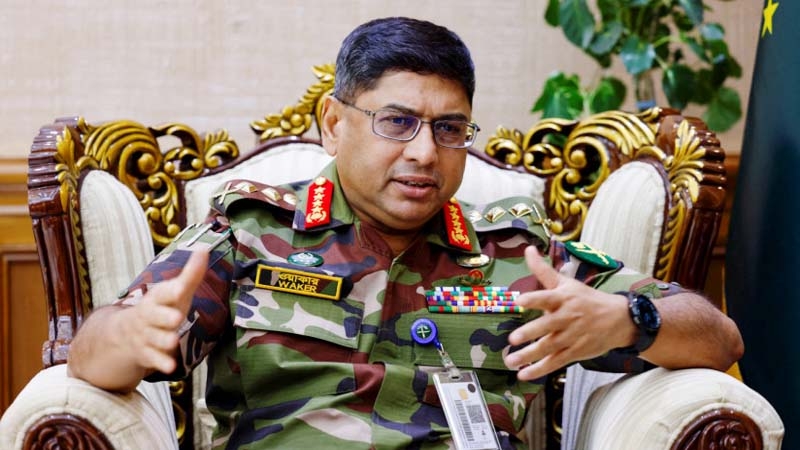- Guterres Urges Leaders to Act as UNGA Week Begins |
- BNP to go door to door for hearts and votes |
- Chittagong port tariffs increased up to 50 per cent |
- Rising Heat Cost Bangladesh $1.8 Billion in 2024 |
- Stocks extend gains; turnover drops in Dhaka, rises in Ctg |
Bangladesh Next Elections Likely Within 18 Months
Army Chief Pledges Support to Interim Government

Bangladesh's Army Chief, General Waker-uz-Zaman, has pledged full and unwavering support to the interim government, led by Nobel laureate Muhammad Yunus. The goal is to implement critical reforms, setting the stage for national elections within the next 18 months, following the removal of Prime Minister Sheikh Hasina, he said.
In an exclusive interview with Reuters on Monday, General Zaman, from his Dhaka office, assured that the military is fully backing Yunus’ administration as it pursues key judicial, police, and financial reforms. These changes aim to ensure free and fair elections and a smooth transition to democracy in the country, home to 170 million people.
"I will stand by him, no matter the circumstances, to ensure he can fulfill his mission," Zaman, dressed in military fatigues, stated during the interview.
The Army Chief’s remarks come after the military refrained from intervening during the student-led protests that forced Hasina to step down in early August, ending her 15-year tenure. Hasina, who fled to India shortly after, left behind a country reeling from the bloodiest period in its history, with over 1,000 deaths due to violent clashes with security forces.
Initially sparked by protests over public sector job quotas, the demonstrations rapidly evolved into a widespread anti-government movement, plunging the nation into chaos. Now, the interim government, tasked with restoring order, has secured the army’s strong backing.
General Zaman, who assumed command just weeks before Hasina’s departure, emphasized that the reform process requires patience. He outlined a timeline of 12 to 18 months for returning to democratic governance, urging political parties and citizens to allow the necessary changes to take place.
"If you ask me, I believe that is the timeframe within which we should enter into a democratic process," he commented.
Bangladesh’s two major political parties, Hasina’s Awami League and the opposition Bangladesh Nationalist Party (BNP), initially called for elections within three months of the interim government taking office in August. However, both General Zaman and Yunus have stressed the importance of comprehensive reforms before proceeding to the polls.
Zaman and Yunus maintain a close working relationship, meeting weekly to review the government’s progress. "I am confident that if we work together, we will succeed," Zaman said.
Meanwhile, with the police force of 190,000 officers still recovering from the unrest, the army has taken over law and order responsibilities across the country.
Reflecting on Bangladesh’s military history, General Zaman reaffirmed his commitment to keeping the army apolitical. As a career infantry officer, he insisted, "I will not do anything detrimental to my organization. I am a professional soldier, and I will keep my army professional."
In line with the ongoing reforms, Zaman disclosed that the military is investigating allegations of misconduct by some of its members during Hasina’s tenure. Disciplinary action has already been taken against those found guilty. Furthermore, a five-member commission, headed by a former high court judge, has been established to investigate the enforced disappearances of up to 600 individuals since 2009.
Looking to the future, Zaman suggested the need for constitutional reforms that would remove the military from political control. He advocated for placing the armed forces under the authority of the president rather than the defense ministry, which is typically controlled by the prime minister. "The military must never be used for political purposes. A soldier should never engage in politics," he stated.
Such changes, according to Zaman, would ensure a balanced power structure between the president and prime minister, while keeping the military focused on national interests. As Bangladesh approaches its next election, General Zaman’s stance highlights a commitment to leading the country towards democratic stability.

